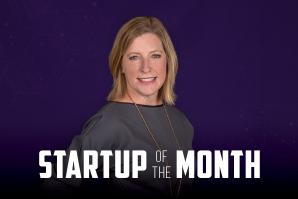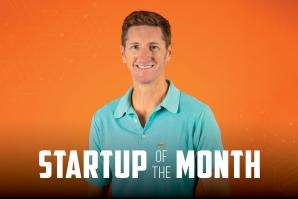Three years ago, Angel Melchor was planning to go to law school, then run for office. He spent 15 years working in political campaigns and government, advocating for environmental issues and social justice. But after a trip to Israel, where Melchor visited the Peres Center for Peace and Innovation, he redirected his energy.
“I felt my greatest impact was not going to be running for office,” he says, “but creating a business that would be meaningful to achieve and promote sustainability.”
Now Melchor is the CEO and cofounder of INN>CHRG (pronounced “In Charge”), a Yolo County-based startup that aims to help eliminate range anxiety for electric vehicle drivers. The exact range varies depending on the EV, as some batteries are built for short trips and others for longer journeys. As automakers see EVs as a trend that will only increase, studies show that the fear of the battery running out before the driver can recharge remains the biggest obstacle for potential buyers. For EV owners, a 2021 J.D. Power survey notes charging costs and lack of infrastructure as key issues.
Melchor’s company is developing an app that allows any private property (residential, business, etc.) with electricity to potentially become a charging location. The startup is in its early stages, but the concept to utilize existing charging stations for EV drivers (similar to the Airbnb model) has gotten traction, and Melchor seeks to enhance the entire experience of driving and owning an EV.
“Our goal is to democratize and decentralize the future of EV charging for anyone to participate in the enhancement of the charging network.”
Angel Melchor, founder/CEO, INN>CHRG
“Our goal is to democratize and decentralize the future of EV charging for anyone to participate in the enhancement of the charging network,” Melchor says.
Melchor doesn’t own an EV. (“I was going to buy one, but I decided to spend the money for business school. Also, I have two kids, which makes it more difficult.”) But his interest in taking care of the environment goes back to childhood. As the youngest of seven children, he was raised by a single mother who had no tolerance for wasting electricity. A dollar more on electricity was a dollar less she had to provide for her children, he says. Melchor also grew up with a strong fear of the greenhouse effect and its impact on the world of tomorrow. All of these factors fueled the creation of INN>CHRG, which has won four awards, including $10,000 from the UC Davis Big Bang! Competition.
Chris Foster is a potential customer who Melchor interviewed for market research. He doesn’t own an EV and shares concerns about range anxiety.
“Nobody wants to be stuck out in the middle of nowhere,” he says. “I know people who have EVs and have a short range. They can only get 40 miles and there might not be a place to charge it.”
Still, Foster wants his next vehicle to be an EV and also says he would use his location as a charging station via the INN>CHRG app and use the service to charge at other places.
“It might be a little awkward sitting around in someone’s neighborhood while you’re charging,” he says. “But I think definitely as an emergency-type thing or depending on the rates too, that could be a good factor.”
Emily Steliotes, who learned about INN>CHRG through the Big Bang! competition, owned a Nissan LEAF EV for three years and can vouch for the concern of range anxiety. But ultimately, she felt it was worth it. Her partner, Noah Katz, owns a Tesla and had the experience of reaching a destination but having to drive back in the wrong direction for a charge. His friends get excited to borrow the car, he says, but when he asks if they plan to purchase an EV, those conversations go nowhere. Reluctance may change in the future as the sharing economy model continues to evolve.
“We’re also very open to this because we’re of a generation that is comfortable using Airbnb,” Katz says. “We’re willing to experiment with new technology. Apps are not scary to us. I can imagine a subset of the population who EVs work well for but who are not tech savvy to go to other chargers outside of their home or immediate business needs.”
For Steliotes, the Airbnb model of INN>CHRG appeals because of the human aspect. “You can interact with the person renting out the place to you,” she says. “To get to talk to people that in space creates a sense of community.”
–
Stay up to date on business in the Capital Region: Subscribe to the Comstock’s newsletter today.
Recommended For You

Startup of the Month: RevShopp
Platform shapes a better way to shop
Every body has a type. But clothing stores typically focus on sizes, which does a disservice to both retailers and customers, says Amy Wister, cofounder and CEO of RevShopp.

Startup of the Month: Factory OS
You might not associate remote work with construction, but Mare
Island-based Factory OS is redesigning the business model by
building multifamily homes off-site, then shipping them to the
designated location.

Startup of the Month: Trusty
Real estate platform adds perspective
“Why can you read reviews on what restaurant to eat at or hotel to stay at or what vacuum to buy, but when it comes to the largest financial purchase of your life, there’s nowhere to go?” says Tim Hyer, cofounder and CEO of Trusty.

Startup of the Month: Reviver
Digital license plates turn cars into smart machines
How much would you pay to never have to step foot in the Department of Motor Vehicles again?

Startup of the Month: TurtleTree
Business grows cells to create milk and milk ingredients
Milk may do the body good, as the 1980s campaign stated, but Fengru Lin, cofounder and CEO of TurtleTree, believes milk production without cows could do the planet even better.





Comments
INN/CHRG sounds like a laudable enterprise, however it has existed for several years in the form of PlugShare. Back in 2013, I contacted a PlugShare member (membership is free) about using their EVSE to recharge our 110 mile range EV while attending a wedding. There were no commercial EVSEs in the area of the wedding in 2013. The owner was quite pleasant, even allowing us to use a spare room to change for the wedding. Unfortunately, I doubt the same consideration exists as often now, because the first adopter situation has passed. I hope your goals will bring back that opportunity and reduce range anxiety for those who are not already EV owners, for whom range anxiety is now much less important a concern.